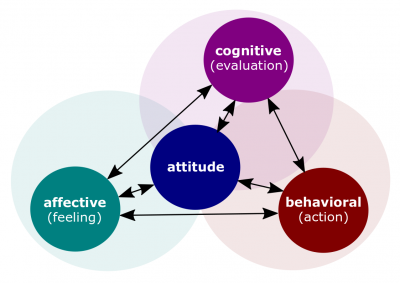Difference between revisions of "Attitude"
(→Related coursework) |
|||
| Line 10: | Line 10: | ||
*[[Behavioral component]]. The segment of an [[attitude]] that refers to an intention to behave in a certain way toward someone or something. | *[[Behavioral component]]. The segment of an [[attitude]] that refers to an intention to behave in a certain way toward someone or something. | ||
| − | ==Related | + | ==Related lectures== |
*[[Individual Decisions Quarter]]. | *[[Individual Decisions Quarter]]. | ||
[[Category: Septem Artes Administrativi]][[Category: Articles]] | [[Category: Septem Artes Administrativi]][[Category: Articles]] | ||
Revision as of 15:05, 4 January 2019
Attitude is an evaluative statement or judgment, either favorable or unfavorable, concerning objects, people, or events.
Definitions
According to Organizational Behavior by Robbins and Judge (17th edition),
- Attitude. An evaluative statement or judgment concerning objects, people, or events.
Components
- Cognitive component. That part of an attitude that's made up of the beliefs, opinions, knowledge, or information held by a person. In other words, the cognitive component is the opinion or belief segment of an attitude.
- Affective component. The emotional or feeling segment of an attitude.
- Behavioral component. The segment of an attitude that refers to an intention to behave in a certain way toward someone or something.
